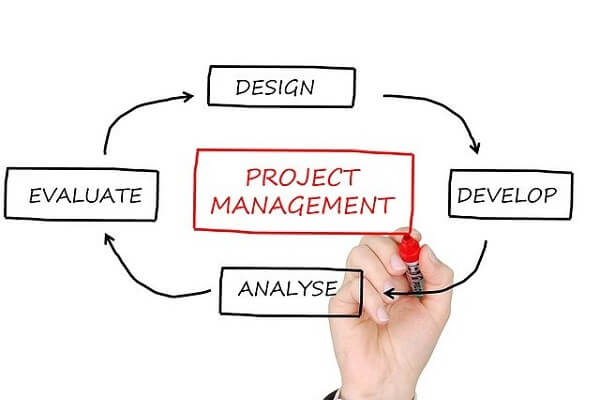Hiring project managers is not an easy feat for any organization or recruiting agency. For this reason, you have to prepare your project manager interview questions mindfully. The last time we met, we discussed how to prepare for assessing project managers in the pre-employment phase. Today, we will take one step further and see some of the best questions to ask candidates who applied for this position. Let’s get to work, shall we?
How to Prep Project Manager Interview Questions
As we said in our guide on PM skills companies hire for, HR experts have to focus on multiple dimensions when recruiting project managers. With the help of in-situ exercises and simulations, they can learn more about candidates’ technical/hard skills.
Personality inventories, integrity tests, and many cognitive assessments help recruiters understand many applicants’ soft skills. But, as always, identifying the exact employment skills you need to hire someone talented does not exclude the interview from the equation.
The best solution at hand to design a successful interview for project managers is to use a candidate scorecard, especially if you want to compare applicants’ results. This instrument will allow you to use the same line of questioning and criteria for all candidates so that you can achieve quantifiable and objective results.
Of course, experienced recruiters will always use a mix of traditional queries and behavioral interview questions to get a better idea of who the person in front of them is. When you design manager interview questions, you should focus on: technical knowledge/experience, personality, and soft skills.
10 Project Manager Interview Questions To Assess Knowledge & Technical Competencies

Of course, candidates already submitted their resumes and, most likely, passed your technical competency tests, exercises, and simulations. It doesn’t mean you can leave this dimension out entirely from your interview. Let’s see X questions to ask candidates.
1. What types of projects have you managed before?
With this question, you want to learn more about the candidate’s past projects’ magnitude, size, purpose, complexity, etc. This question goes to know-how, experience, and other technical skills you might not have practically assessed yet. It sounds like a basic question whose answer is already in the CV but takes the opportunity to allow the candidates to explain more about their skills.
2. What was your most successful project? Tell me about its purpose, deliverable, stakeholders, budget, problems, results, etc.
This line of questions allows the candidate to freely discuss a project in which they invested professionally and personally. You can extract much more information from such a question than technical skills. You can understand better how applicants understand the pain points projects need to solve, how they communicate, how they position themselves concerning stakeholders, challenges, etc.
3. What project management tools do you prefer using and why?
You don’t want to necessarily hear that one tool’s interface is friendlier than another’s. You want to learn with this question if candidates can adapt and learn quickly to use your company’s tools within project management. What if your organization does not use the candidate’s preferred instrument?
4. What is the ideal project you’d like to manage? And what project wouldn’t you want to manage ever?
You understand candidates’ flexibility and adaptability here. Anyone should do only the things they love, but it is not how it goes in real working environments. Would your company face problems if the PM resents the project/job at hand? What if a candidate refuses to work on some projects?
5. What is the most important thing a project manager has to do in the first days on the job?
Let the candidates talk freely about their prioritization processes and organizational skills. You will soon learn if an applicant is also a good organizational fit as corporate culture goes. There is no right or wrong answer here. All you want to learn is how the candidate aligns with the company’s priorities, values, objectives, etc.
6. What do you do most time during the workday?
Suppose you want your project managers to glue themselves in front of the PC screen. In that case, a candidate who prefers to visit stakeholders or participate in interdepartmental meetings will not probably be a good fit for you.
Surely, we want our PMs to multitask all day long and perhaps be in multiple places simultaneously, but we have to maintain realistic expectations. Understand how PM candidates see and do their jobs and how they prioritize their weekdays. Some keep in touch with all team members mostly; others stick to their tasks without even looking around.
7. Have you managed remote teams before? How do you plan to collaborate with people working from home?
Even before the global health crisis, project managers had to work with and manage a global workforce. In many industries – with an emphasis on IT – managing remote teams is customary. However, if your company’s projects now need to adapt to the work-from-home paradigm, it is wise to understand candidates’ different management techniques. Managing people, resources, stakeholders, and deadlines while relying on digital instruments, online meetings, and reduced mobility is a challenge for seasoned and beginner PMs. Learn more about how your candidates approach these issues.
8. What do you think are the most important skills to have to become a successful project manager?
While this inquiry taps more into candidates’ personalities than their knowledge and experience, it is still one of the best project manager interview questions to ask. Your candidates might focus on technical skills or interpersonal skills more, so you will have a better idea about their positioning regarding the job and its stakes. You can ask for examples if a candidate mentions one-two skills they favor the most. You can extract some information regarding their leadership styles, values, ability to learn and adapt, etc.
9. What problem-solving techniques do you use when you encounter a challenging situation while managing the project?
In our times, project managers need to demonstrate creative problem-solving skills to navigate all the changes, obstacles, shifts, problems, and disruptions affecting their projects every day. Sure, you already applied a problem-solving test as part of your cognitive assessment battery, and you already evaluated cognitive flexibility. Most likely, you offered the candidate the chance to prove problem-solving prowess in organized simulations.
But you want more than a robot using algorithms, don’t you? This question should lead to an interesting discussion with examples so you can understand better a candidate’s willingness to step out of the box and find creative solutions to unexpected problems.
10. What are the steps you will take to manage risk in this project?
Risk management is a crucial hard project management skill, and you can’t hire anyone who does not show expertise on this matter. With this question, you can learn more about candidates’ effective risk planning skills, knowledge in risk management strategies, and even their leadership style.
When it comes to asking project management interview questions related to technical competencies, you can go as far and deep as you want. It is not reasonable to prepare hundreds of questions, but consider the ones related to your company’s strategic goals, culture, etc.
5. Project Manager Behavioral Interview Questions

We want to say that we arrived at the fun part of this interview, but behavioral interviews need extensive preparation, so you will have plenty of work to do. Make sure that you don’t overstep the line and enter the realm of illegality.
We know you want to assess the integrity, and you can, but have the company’s attorney look over the questions. It is not OK to ask people if they were ever arrested only to guess whether there’s a chance for them to award acquisition contracts to their friends for hefty kickbacks.
1. Tell me about a situation when you had to adapt and manage sudden project workflow changes. How did you go back on track?
With this question, you want to learn how the candidate defined changes, developed a plan to address them (processes & people), assessed risks, communicated with stakeholders, etc. This question allows you to explore candidate-specific project management competencies. You can also learn about the applicant’s communication skills, teamwork skills, etc.
2. What was the most stressful aspect you had to deal with while managing a project, and how did you deal with it?
The ability to deal with stress, employ coping mechanisms, and focus on the objectives even when the situation seems chaotic are crucial project management skills. Coping with stress is hard to assess objectively through standard testing. Nevertheless, prepare a thorough line of questioning. You can get a good idea about candidates’ abilities to work under pressure, manage stressed-out teams, make good decisions despite adversity, and so on. At this point, you should focus on the applicant’s skills:
- Technology & processes management;
- People management;
- Risk management;
- Problem solving;
- Expectations’ management, etc.
3. How do you manage a team member who is less productive and slows things down?
You expect your candidate to share thought processes, team management skills, communication skills, assertiveness, emotional intelligence, etc. You can correlate the interview question with the results you obtain by applying the Big 5 Personality Inventory and the People Skills Test. This question, together with the next one, taps into leadership. We strongly recommend you use leadership evaluation tools when you recruit
4. Tell me about a situation where you had to manage a team conflict. What did you do, how did the conflict resolution?
Conflict management and communication with the team are on top of the project management skills list. You want to learn more about a candidate’s method of mitigating team tensions and occasional clashes. While you get plenty of information from your standardized tests, you still need to walk through the process of conflict resolution with the candidate. It is an excellent instrument to identify leadership skills and leadership styles.
5. How would you finish tasks with conflicting goals or deadlines?
Managing workload and mitigating the inherent conflicts in project processes is something project managers have to deal with every day. Key to productivity, such abilities tap into the candidates’ creative problem-solving skills, stress management, even work-life balance. If you want to select worthy candidates to retain and grow, maybe you should use a couple of leadership assessment tools to identify future leaders for roles the organization doesn’t even have but plans to for the future.
A red flag is up if a candidate says she/he will do overtime to keep up with the workload. If your company culture emphasizes this balance and does not encourage employees to “sleep at the office,” then this person might not be a good fit for you. Time management, task management, organization, and prioritization may be issues to analyze further.
A Few More Considerations When Preparing Your Project Manager Interview Questions
As usual, you have to look at your interview as it was a smaller component of a larger mechanism. Some small companies use only interviews to select candidates, and, in some circumstances, it can be enough. However, as organizations evolve, their needs and processes develop. Companies focus on creating evergreen opportunities for people and roles to grow together in their talent-hiring strategies.
For this reason, most companies use pre-employment assessment tests. Combining them correctly gives you more chances to hire the right candidates for the right positions, engage employees, retain them, etc. The interview for a project manager position is a crucial component of your evaluation process, so treat it wisely. A mix of standard questions, behavioral interview questions, and even unexpected (weird) questions help you understand better the person you are about to hire and turn into a leader.
Now it is your time to discuss! What other project manager interview questions do you use, behavioral or otherwise? What instruments do you employ when you recruit managers? We would love to hear about your experiences!


